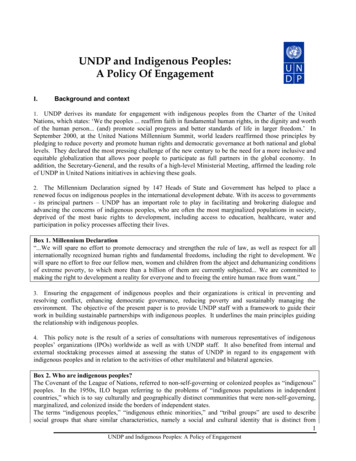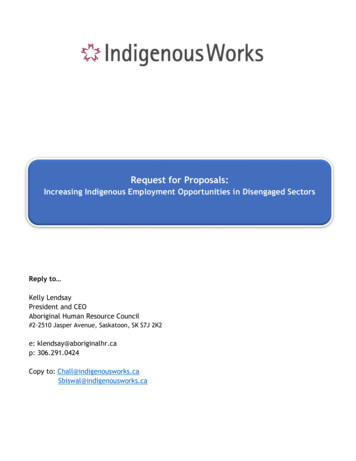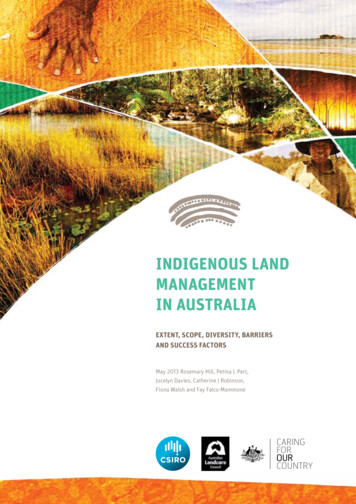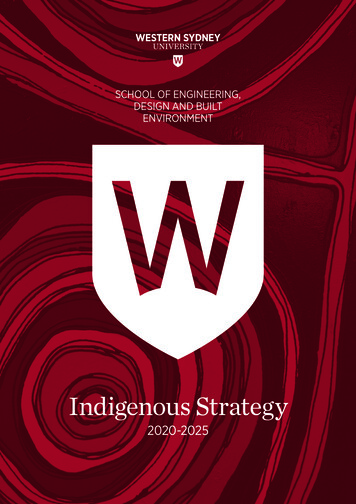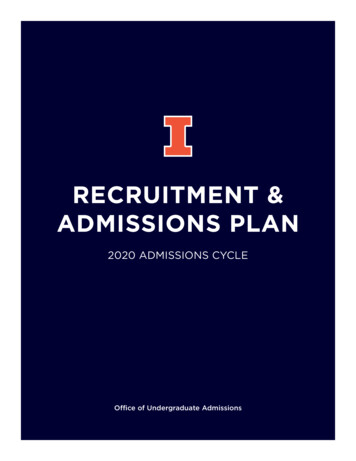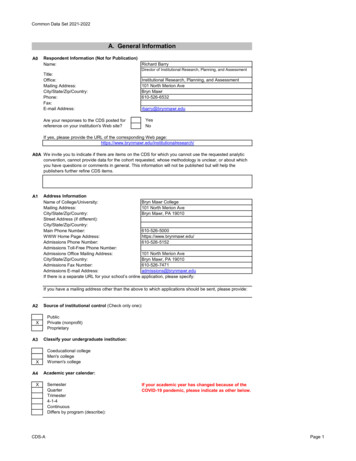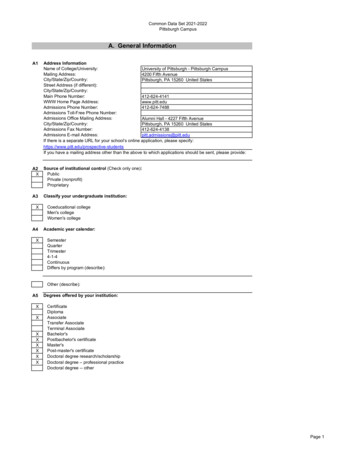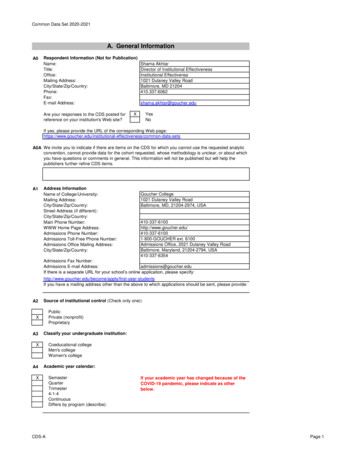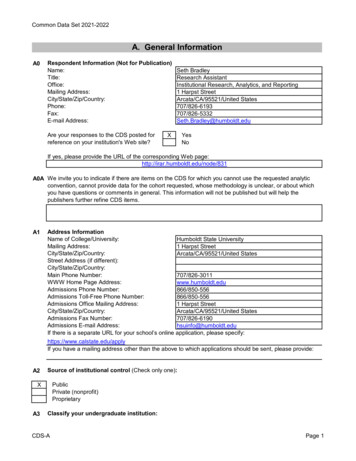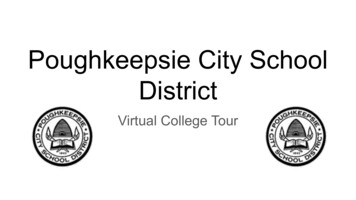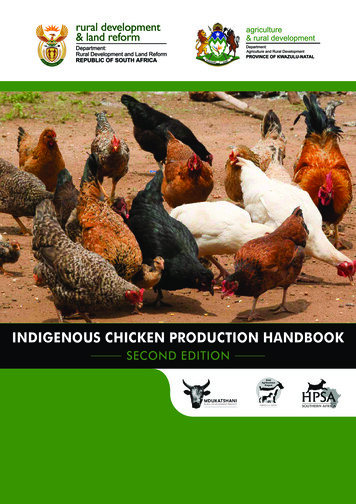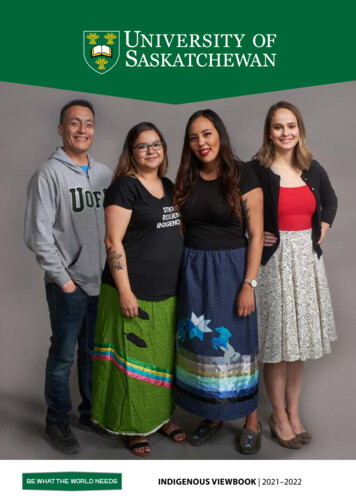
Transcription
INDIGENOUS VIEWBOOK 2021–2022
WELCOMEtaanishinuhha ho?ątawā aƞyaƞ yahip̄idąyą́ wacímnagatawāwThe University of Saskatchewan (USask) sits alongthe kisiskaciwani-sipiy (South Saskatchewan River)in Treaty 6 Territory and the Homeland of theMétis. This is a place that is part of a millennia-oldtradition of people gathering on the banks of thisriver to learn, to teach and to form community.We welcome all students, including ourIndigenous students, to join us in building truth,knowledge and relationships in all their forms.1relationships that can support future ambitions,and to be successful in all learning pursuits.MICHIFSAULTEAUXNAKOTAUSask is a place that promotes and supports thelearning of Indigenous Knowledges and waysof living. Our campus community encouragesIndigenous students to explore the worldthrough education, to invest in meaningfulKHONISSWUTTUNEE2019 GRADUATIONPOWWOW HEADWOMAN DANCERDENEDAKOTA AND LAKOTAPLAINS, WOODLANDAND SWAMPY CREEThrough collaboration, innovation, respect andhumility, the university fosters a welcomingenvironment that provides opportunities for ourcommunity, including students, to gather and toconstructively and respectfully dialogue and planfor the university environment we want and need.Through our university plan—and throughthe spirit embodied in nīkānītānmanācihitowinihk ni manachīhitoonaan(“Let us lead with respect”)—USask will be theuniversity the world needs.Cover, left to right: Dustin Gamble (BEd‘19), Brittanni-Anne Roberts (BSN‘19), Sturgeon Lake First Nation, Katherine Burns (BSN‘19) and HilaryPeterson (LLM‘19), Saskatoon, at the 2019 Graduation Powwow. Notes: 1. From Our Learning Charter, revised in 2018.2
EVENTSIndigenous Graduation CelebrationWith its origins dating back to the 1980s, theuniversity’s annual Indigenous GraduationCelebration (formerly the Graduation Powwow) isheld to celebrate the academic success of Métis,First Nations and Inuit graduates from USaskand local secondary schools. It is also a timeto celebrate the Indigenous communities andcultures at USask and around the province. This isthe largest annual Indigenous event held by theuniversity and attracts over 3,000 participantseach year.MURAL BYARTISTS CHRISTIBELCOURTAND ISAACMURDOCKIndigenous Achievement WeekIndigenous Achievement Week (IAW) is anannual event that celebrates the successes andcontributions of Métis, First Nations and Inuitstudents, staff, faculty and alumni. Each year,Indigenous students from across USask choose atheme. In 2021, the theme was nīkānihk itohtētān,walking together into the future.One of the highlights of IAW is the IndigenousStudent Achievement Awards Ceremony, whereIndigenous students are honoured for theiracademic excellence, leadership, unique orimportant research, personal resiliency andcommunity engagement.2019 Graduation Powwowmāmowi āsohtētān Internal Truth andReconciliation ForumThe fourth annual māmowi āsohtētān InternalTruth and Reconciliation Forum, was hostedvirtually by USask in March 2021. This eventis a response to the Truth and ReconciliationCommission of Canada: Calls to Action andprovides an opportunity for students, staff andfaculty to gather and to constructively andrespectfully dialogue and plan for the universityenvironment we need and want. In 2021, theinteractive and dialogue-focused event focusedon Theories, Principles, and Practices fo AntiRacism and Anti-Oppression, with a specialkeynote presentation from Dr. Verna St. Denis,USask’s special advisor to the president on antiracism and anti-oppression.2020 Indigenous Achievement Week2020 māmowi āsohtētān InternalTruth and Reconciliation Forum3CREELANDDANCERSPERFORMING AT THE 2019GRADUATION POWWOW
COMMUNITY OF SUPPORTSOUP ANDBANNOCKAboriginal Students’ CentreThe Aboriginal Students’ Centre (ASC), locatedin the Gordon Oakes Red Bear Student Centre,is part of a wide community of support at USaskdedicated to Indigenous students’ academic andpersonal success.The ASC team offers personal, social, culturaland academic support, and works in closecollaboration with partners across the universityand with community organizations to connectyou with services and opportunities to help youachieve your goals.Along with the many events organized in supportof students throughout the year, the ASC isresponsible for organizing the annual MétisDinner and Dance, Indigenous AchievementWeek and the Indigenous Graduation Celebrationto celebrate the successes and contributions ofMétis, First Nations and Inuit students, staff andfaculty. New student support Orientation Monthly check-insAcademic programming Student Success workshops TutoringCultural supports Elders and Knowledge Keepers Pipe and sweat lodge ceremonies Weekly grounding circles CreativiTeaWellness programing Fitness4U ASC intramural sports teamsSocial programming Parent Circle Weekly soup and bannock lunchesIntercultural programming ROLANDDUQUETTEANDLOUISE HALFEROLAND AND LOUISE AREELDERS AND ADVISORS ONINDIGENOUS TRADITIONSAT THE GORDON OAKES REDBEAR STUDENT CENTREGordon Oakes Red Bear Student CentreAs an intercultural gathering place, the GordonOakes Red Bear Student Centre brings together theteachings, traditions and cultures of the peoplesof Saskatchewan. Grounded in the teachings ofcollaboration, cooperation, humility, reciprocityand sharing, the centre aims to enhance Métis,First Nations and Inuit student success.The centre’s purpose is to facilitate the coordination4Building Bridges activities with internationalstudentsof effective student services for Métis, First Nationsand Inuit students and build relationships withinand outside the university with Indigenous Peoples.The centre provides a home for Indigenousundergraduate and graduate student leadershipand allows for mutual learning opportunities forstudents and faculty. The centre also functions asthe university’s hub for on-campus Indigenousengagement and initiatives.
LEARN WHERE YOU LIVEUSask is a welcoming place where you will findprograms, services and people dedicated to yourpersonal and academic growth. The universityaims to meet and respond to the changing needsof our students, as well as our local and globalcommunities.Whether you live in Saskatoon, are planning a move,or are looking for education opportunities aroundSaskatchewan, USask offers many accessible educationopportunities. We’ve partnered with communities,First Nations and Saskatchewan educationinstitutions for over 40 years to provide students withopportunities to study and learn close to home.USask Saskatoon main campusUSask’s main campus in Saskatoon is the academichome of our wide range of excellent programsand an array of world-class centres and facilities,allowing students, faculty and researchers tocross traditional discipline boundaries and worktogether to bring a unique perspective to keyglobal challenges. Our Saskatoon campus offers anexciting atmosphere with many opportunities toget involved, connect with other students and bepart of a community working to be what the worldneeds.College of NursingSaskatoon, Prince Albert, Regina, Yorkton,Île-à-la-Crosse, La RongeIndian Teacher Education Program (ITEP)Saskatoon (main campus), Kahkewistahaw FirstNation (community-based program)Saskatchewan Urban Native TeacherEducation Program (SUNTEP)Offered in Saskatoon and Prince Albert througha partnership between Gabriel Dumont Instituteand the USask College of EducationGabriel Dumont CollegeAffiliated with USask and offers Arts and Sciencecourses in Saskatoon and Prince AlbertAffiliates and regional college partners St. Peter’s College (USask affiliate)Muenster Cumberland CollegeMelfort, Nipawin, Tisdale Great Plains CollegeSwift Current North West CollegeMeadow Lake, North Battleford Northlands CollegeBuffalo Narrows, Creighton, Île-à-la-Crosse,La Ronge Parkland CollegeCanora, Fort Qu’Appelle, Melville, YorktonUSask Prince Albert CampusThe USask Prince Albert Campus brings togetherUSask’s educational programming which waspreviously taking place at sites across the city,increasing opportunities for students in differentprograms to connect with each other and to accessservices.COLLEGE OFNURSINGREGINA CAMPUSProgram in Cumberland House works toaddress teacher shortageIn 2019, the College of Education, in partnership withthe Northern Lights School Division, the NorthernVillage of Cumberland House, Cumberland HouseCree Nation and Métis Nation–Saskatchewan, beganoffering the Bachelor of Education to students in thenorthern community. Students in the program arecurrently entering their third year, with teaching areasfocused on Indigenous Studies and Cree.USASKPRINCE ALBERTCAMPUS“For me, it’s great to be able to stay in my community,my home, and continue to raise my son here,” said IrisMcKenzie, one of the students admitted to the program.“It’s financially a lot easier — a home run really — totrain to be a teacher here in Cumberland House.”5
ARTS AND SCIENCEISAP students and artist-in-residence Lyndon Tootoosis contribute toanohc kipasikônaw / we rise / niipawi, a community art project initiatedduring Indigenous Achievement Week 2020.Welcome! There’s a place for you in theCollege of Arts and Science. With over 60 areasof study to choose from, as well as a wide range ofstudy abroad and work placement programs, ourcollege is a great launch pad to any path you choose!Degrees and certificates with anIndigenous focus: Bachelor of Arts – Indigenous Studies Bachelor of Arts – Sociology – IndigenousJustice and Criminology (IJC) Certificate in Indigenous Governance andPolitics Certificate in the Study of IndigenousStorytelling wîcêhtowin Theatre Certificate in DramaThe Trish Monture CentreRUTH CUTHAND(BFA’83, MFA’92)2020 GOVERNORGENERAL’S AWARD INVISUAL AND MEDIA ARTSRECIPIENTThe Trish Monture Centre (TMC) is a central spacein the College of Arts and Science dedicated tostudent achievement. Visitors to our space at the‘Top of the Ramp’ (Arts 250) will find a bright andwelcoming place to gather, visit and study withaccess to WiFi, a microwave and coffee pot. Sinceopening in 2014, the TMC has rarely been empty!Students visit the TMC to connect withknowledgeable staff and make appointmentsto meet advisors for both Indigenous StudentAchievement Pathways and the University TransitionProgram. Both programs work in partnership withthe Undergraduate Student Advising Office (downthe hall in Arts 265) to offer a holistic approach toacademic advising that greets students’ mental,6physical, emotional and spiritual selves withexpertise specific to their student experience.Indigenous Student AchievementPathwaysArts and Science Indigenous StudentAchievement Pathways (ISAP) welcomes FirstNations, Inuit and Métis students to the collegethrough academically grounded programmingthat builds confidence, knowledge and skills,while connecting students to one another and toour campus community.ISAP First-year Learning Communities bringstudents with common academic goals togetherin popular 100-level courses that bring anIndigenous lens to the fine and performingarts, social sciences and humanities, and to thedisciplines of science, technology, engineeringand mathematics (STEM). Weekly gatherings withIndigenous peer-mentors provide connectionpoints with peers, Elders, Indigenous faculty andalumni role models.To join ISAP’s community for learning:1) A pply for admission to the College of Arts andScience.2) A fter you are admitted, fill out the onlineISAP registration form (available in March onartsandscience.usask.ca.3) Receive confirmation of registration throughphone and/or email communications.4) K ick-start your fall term by joining ISAP’s 3-daySummer Start, held in late August each year.
STEM PathwaysISAP offers access, entrance and enrichmentopportunities to Indigenous students interested inpursuing STEM degrees in the College of Arts andScience or in USask’s undergraduate and professionalcolleges.ISAP STEM Accelerator courses and preparatorycertificateISAP’s non-degree credit STEM Prep courses(Biology 90, Chemistry 90, Physics 90, andMath Lab) can be taken individually, or towarda STEM Accelerator Certificate. These classesare designed for students who want to pursuea degree in science or a related professionaldegree (e.g. health science, science educationand engineering) who need these high schoolprerequisite courses or who have been away fromschool for more than three years and would liketo refresh their knowledge of these subjects.ISAP First-year Medicine Wheel LearningCommunityISAP’s Medicine Wheel Learning Community offers100-level science courses in Term 1 and Term 2designed to provide a strong start to STEM-degreepathways in the natural sciences, health sciences,computational sciences and engineering.ISAP Common Courses and Indigenous StudentScholar’s Experience (ISSE) workshopsIn second year and beyond, undergraduate studentsin Arts and Science can access unique interdisciplinarycourses that integrate Indigenous perspectivesand support success in diverse degree programs.ISSE workshops are facilitated by Indigenousgraduate students and Arts and Science staff withthe goal of building a community of Indigenousscholars committed to critical inquiry, hands-onand community-based learning, and exploringopportunities beyond graduation.KATE BOYERST. LAURENT DE GRANDIN, SKBACHELOR OF ARTS STUDENT“ If you are considering coming to the USask, just do it!There are so many supports for Indigenous studentsthat make building a supportive community easier. Iespecially love all the opportunities available to keepinvolved in sports and extracurricular activities. Itreally helps ease the stress of university to be able to beinvolved in things you love.”I’m a third-year Arts and Science student and I’mloving every minute of it (ok, except for finals). Igrew up on a traditional Métis Riverlot on the banksof the South Saskatchewan River near Batoche. Ispent my childhood running through grassy fieldsand climbing trees. My parents homeschooled mein our small Métis community and I attribute mycuriosity and wonder of the world to this invaluableunschooled education. Later on, I attendedRosthern Junior College where I was welcomed intoa community that valued peace and making theworld a better place. There I learned that by beingmyself and spreading love, I would find success andJEREMY SMITHMÉTISCOMPUTER SCIENCESTUDENT2020 INDIGENOUSSTUDENT ACHIEVEMENTAWARD WINNER, COLLEGEOF ARTS AND SCIENCEfulfilment. I also learned how to write a mean essay!As for the present, I live in Rosthern, Saskatchewanwhere I love to laugh and make art. I have a passionfor learning and in the future I hope to designcommunity spaces in a way that will improve thequality of life for everyone, no matter their social oreconomic status.7
EDUCATION2019-2020 ITEP Student CouncilIndigenous education in the College of Educationis a priority to our institution. Indigenousknowledge and worldview is a vital componentto education in Canada, and the SaskatchewanMinistry of Education has mandated the inclusionof First Nation, Inuit and Métis content in allsubject areas from K-12.In the College of Education, we are committed toproviding the resources, opportunities, scholarlyresearch and materials needed to provide teachercandidates with the tools necessary to fulfill thismandate, and we are proud to have one of thelargest numbers of Indigenous education alumniin the world.Indian Teacher Education Program(ITEP)ITEP has been serving First Nations educationsince 1972 and is the largest First Nations-specificteacher education program in the country.Through this four-year program to earn yourBachelor of Education degree, you will learn torespond to the cultural and educational needsof First Nations students, communities andstakeholders.ITEP offers a holistic, family-oriented approachto post-secondary education, centred aroundthe expertise of our instructors, Elders, WisdomCarriers and counsellors.ITEP also offers programming outside of Saskatoonand has served over 16 First Nation communities/partners since 1974.KARON SHMONDIRECTOR, MÉTIS CULTURE AND HERITAGE AT THE GABRIELDUMONT INSTITUTEMany paths have converged to lead Karon Shmonto her current position as Director, Métis Cultureand Heritage at the Gabriel Dumont Institute (GDI),a Saskatchewan-based Métis organization withculture and education as its focus. Her roots in theone-room cabin at Chitek Lake where her motherwas raised and the family’s annual visits to Batochehelped her to understand her heritage and to beproud of being Métis. Since receiving her Bachelorof Education from USask in 1980, Karon’s career hasfocused on making education equitable and she isdriven by her personal mantra to “affirm ourselves,and inform others.” This makes her work at GDI hertrue calling. She considers it a privilege to have theopportunity to work with Métis Elders, authors,artists, poets, performers, knowledge keepersand community members and to preserve theirvoice, and legacy, through the publications andresources created at the Institute. In 2019, Karonwas recognized for her significant contributions toIndigenous initiatives with a College of EducationWall of Honour award.AMANDA JOBBPETER BALLENTYNE CREENATION2020 INDIGENOUSSTUDENT ACHIEVEMENTAWARD WINNER, COLLEGEOF EDUCATION, ITEP,AWARD FOR COMMUNITYINVOLVEMENT8“Being a teacher means making a commitment toguiding learners as they develop important skills,explore a wide range of interests, and pursue theirgoals and aspirations. Watching students grow andsucceed is both a privilege and a reward which willmake you proud to say, ‘I am a teacher.‘”
2019-2020 SUNTEP Student CouncilSaskatchewan Urban Native TeacherEducation Program (SUNTEP)Founded in 1980, SUNTEP is a four-year teachereducation program designed for Métis students thatculminates in a Bachelor of Education degree. Theprogram is offered in Saskatoon and Prince Albertthrough a partnership between the Gabriel DumontInstitute (GDI) and the USask College of Education.This program has a strong emphasis on Métishistory, Michif language, social justice and antiracist/anti-oppressive education. The programcombines academic education with classroomexperience and a thorough knowledge of currenteducational issues.The primary goals of the program are to ensurepeople of Métis ancestry are equitably representedin the teaching profession and to ensure graduatesfrom the program are responsive to the needs of allstudents.Certificate in Indigenous LanguagesThe College of Education offers a number oflongstanding and new certificate programs to assistcurrent educators to deepen their knowledge in achosen area, including the Certificate in IndigenousLanguages. This certificate is designed for educatorswho wish to learn Cree while exploring Indigenousteaching methodologies.ELDER NORMAN FLEURYST. LAZARE, MB, VIRDEN, MB AND SASKATOON, SKSPECIAL LECTURER, COLLEGE OF EDUCATIONMICHIF/MÉTIS ELDER FOR USASK AND MÉTIS NATION - SKNorman Fleury is a proud Michif/Métis Elder fromSt. Lazare, MB. Norman was raised on a small farmwith his eight siblings by his mother, Flora Leclerc,a strong, well-respected Michif woman and widow.She lived to 108 years of age, giving her a long time toshare her love of her language and cultural traditionswith Norman.Since 1989, Norman has maintained a farm nearVirden, MB with his wife, Ruth Ann, and their children,Chantelle and Marc. He also calls Saskatoon home,where he actively champions the preservationof Michif language and culture and is known forusing his rich and warm personality to offer Michiflanguage classes, stories and worldview teachings.He has created and co-created extensive Michiflearning resources, both print and digital, and isoften found at Westmount School, Gabriel DumontLocal 11 and CUMFI supporting many Métis languagedevelopment and preservation initiatives.DAULTONSINOSKIMÉTIS NATION2019 INDIGENOUS STUDENTACHIEVEMENT AWARDWINNER, COLLEGE OFEDUCATION, SUNTEP,AWARD FOR LEADERSHIPHUSKIE VOLLEYBALLPLAYERUSPORTS ALL-ACADEMICTEAM AND 2ND TEAMCANADA-WEST ALL STARAs a Michif/Métis Elder at USask, Norman has helpedin the signing of an MOU between the universityand Métis Nation–Saskatchewan while supportingSUNTEP, Indigenous Voices and other Indigenousprograms. He sits on numerous committees andworks with many units including the AboriginalStudents’ Centre and Indigenous Engagement Officeto ensure Métis people have a place and space oncampus.9
EDWARDS SCHOOL OF BUSINESSInuit art collection on display in the Edwards atriumThe Edwards School of Business strives to bea leader in providing dedicated support andservices unique to Indigenous business studentsamongst business schools across Canada.Aboriginal Business AdministrationCertificate (ABAC)This certificate program offers self-declared Métis,First Nations and Inuit students a gradual steptowards a successful career in business with anoption to transfer into the Bachelor of Commercedegree program upon completion. In this program,you will receive an introduction to business,including courses in accounting, marketing,finance and human resource management. ABACalso incorporates significant student successactivities to prepare you for your future in business.Indigenous Business Students’ Society(IBSS)The IBSS strives to create a community for FirstNations, Métis and Inuit students in commerce. Thegroup focuses on planning events where traditionis evident, Indigenous students feel motivated toachieve and a community of support is present.JESSICA MIRASTYFLYING DUST FIRST NATIONPURSUING A BACHELOR OF COMMERCE IN MANAGEMENTINDIGENOUS BUSINESS STUDENTS’ SOCIETY CO-FOUNDERBRAYDON CARONFROM ST. LOUIS, SK, ANDA MEMBER OF THE PETERBALLANTYNE CREE NATIONSTUDYING IN EDWARDSSCHOOL OF BUSINESS,MARKETING2021 INDIGENOUS STUDENTACHIEVEMENT AWARDWINNER“ Attending Edwards School of Business has opened upso many opportunities for me as a young Indigenousstudent. I have made lasting connections and considersome of my classmates to be some of my best friends.It may be scary to be on your own in university andespecially to move away from the reserve like I did — butthere are resources there in Edwards and support groupslike IBSS to help you succeed and complete your degree.”Jessica is majoring in management and is currently onan eight-month co-op internship with RBC. She hopesto gain valuable financial knowledge to bring back toIndigenous communities or organizations.10Rawlinson Centre for IndigenousBusiness StudentsThe Rawlinson Centre is one of the only dedicatedspaces for Indigenous business students in thecountry. At the centre, you can find a place tostudy, attend cultural events, access tutoringservices and learn about opportunities forIndigenous business students at USask, includingthe Math Bridging Program and scholarships.Math Bridging ProgramIf you are interested in a program at USask thatrequires Foundations of Mathematics 30 and/orPre-Calculus 30, the Rawlinson Centre can helpyou upgrade while taking courses in the ABACprogram.ScholarshipsIn addition to general USask scholarships,bursaries and awards, Edwards has a numberof dedicated awards for self-declared Métis,First Nations and Inuit students. For example,the Rawlco ABAC Awards (valued at 2,000) areprovided to all graduates of the ABAC program.
Hunter McLean, former headperson for the Indigenous Business Students’ SocietyAUBREY-ANNELALIBERTE-PEWAPISCONIASCANOE LAKE CREE FIRST NATION, TREATY 10 TERRITORYAND LITTLE PINE FIRST NATION, TREATY 6 TERRITORYPURSUING A BACHELOR OF COMMERCE IN FINANCEINDIGENOUS BUSINESS STUDENTS’ SOCIETY CO-FOUNDERWE MATTER AMBASSADOR OF HOPECANDO NATIONAL STUDENT DIRECTOR“The University of Saskatchewan has a large Indigenousstudent population, one of the largest in Canada, whichmakes our Indigenous student community so strong.There are like-minded people around me and so manystudent groups that are here to build community andmake campus a place where Indigenous students havea unified voice. I believe that as we insert ourselves intothese institutions, we create meaningful change andadd to the strength and power of Indigenous peoples.Getting involved, empowering Indigenous students,learning within and outside of our classes, and buildinga path for the youth to come after us is crucial tobuilding up our people even more. “Aubrey-Anne Laliberte-Pewapisconias is a proudnehiyaw iskwew from Canoe Lake Cree FirstNation on Treaty 10 Territory with paternal rootsto Little Pine First Nation on Treaty 6 Territory. Sheis a currently pursuing her Bachelor of Commercewith a major in Finance and her Global BusinessStream Certificate. Within the campus community,Aubrey has been involved as both an executiveand general council member on the IndigenousBusiness Students’ Society, the Edwards BusinessStudents’ Society, Edwards JDC West, and theFinance Students’ Society. Outside of school, Aubreyhas held different work and volunteer positions withorganizations such as Saskatchewan Indian GamingAuthority, Cando, We Matter, Indigenous CleanEnergy, and the Aboriginal Students’ Centre.In October 2018, Aubrey created the IndigenousBusiness Students’ Society with Jessica Mirasty in thehopes of amplifying Indigenous student voices andto start something to work towards reconciliationand decolonization within the college. The grouphas won multiple awards since starting and allowsfor students to have a unified voice, learn fromothers, be part of the possibilities ahead, developpersonal and professional skills, have awareness ofresources around them, be advocates, supportothers, and overall, create a strong communityof like-minded Indigenous students throughoutUSask. The IBSS has made significant changeswithin the community for Indigenous studentsand paves a path for the Indigenous youth thatcome after us.11ERIN SADERMÉTIS NATION —SASKATCHEWAN(BComm ‘20)2020 INDIGENOUSSTUDENT ACHIEVEMENTAWARD WINNER,EDWARDS SCHOOL OFBUSINESS
ENGINEERINGtawāw! Welcome!Student experienceWe celebrate and share Indigenous ways ofknowing as an integral part of our teaching,learning and research at USask Engineering.Meet up with our USask Engineering IndigenousStudent Ambassadors! They provide academicand peer support and help coordinate studentevents in the college.If you are curious, creative, observant oranalytical there’s a place for you in engineeringApplying to the College of EngineeringTo apply to USask Engineering you need these highschool classes: Chemistry 30, Physics 30 and PreCalculus 30, with a minimum grade of 70 percentin each. If you don’t have those classes or need toimprove your marks, there are programs to help. Indigenous Student Achievement Pathway(ISAP) STEM Accelerator CertificateThis program is based in USask’s College of Artsand Science. It’s for students who want to enrolin colleges such as Engineering, but who needhigh school science courses or who have beenaway from school more than three years andwant to refresh their knowledge.Northlands Pre-Engineering and ScienceThis is a one-year program based in NorthernSaskatchewan with courses including math,chemistry and biology. After completing theprogram, students transition to studying oncampus in Saskatoon to complete their degree.At our events, connect with students inEngineering and other colleges. We will gatherto share meals, and learn about scholarships,conferences, co-op opportunities – and have fun!You can also become part of the USaskChapter of AISES (American Indian Science andEngineering Society) and shape how Indigenousstudents in STEM can make a difference in thecommunity and encourage Indigenous people toconsider STEM careers.Get a head start on your careerBuild confidence by doing a work term withone of our industry partners who are strivingto make their workforces more diverse. Cooperative education is a full-time, paid workplacement opportunity and companies arehiring to fill positions with Indigenous students!To participate, connect with Alana Bitsuie,your USask Engineering Indigenous InitiativesCoordinator.ADAM MCINNESSHAUNAVON, SK, WITH MÉTIS ANCESTRY FROMTHE RED RIVER REGION OF MANITOBAPhD STUDENT IN BIOMEDICAL ENGINEERINGALANA BITSUIERED EARTH FIRST NATION(BA’15, MNGD’18)INDIGENOUS INITIATIVESCOORDINATOR AT THECOLLEGE OF ENGINEERINGAdam McInnes grew up on a small farm in ruralsouthwestern Saskatchewan and wanted to bea scientist as long as he could remember. Hisinterest in making a difference in people’s livesled him to pursue a Doctor of Medicine and now,as a PhD student in biomedical engineering,to conduct research in tissue engineering andregenerative medicine. Outside of his research,Adam has numerous interests, but his passions arein promoting science, technology, engineering andmathematics (STEM), global health, entrepreneurshipand interprofessional education. He performs a lotof volunteer work in these areas, including foundingMed Hack Enterprises Inc., serving as the presidentof the Saskatoon Métis Local 126, as director of theGreater Saskatoon Chamber of Commerce, andmentoring Indigenous students. Due to his work,Adam has received numerous Indspire Scholarships,the University of Saskatchewan MSc Devolved12Graduate Scholarship and the Indigenous GraduateLeadership Award. In 2019, Adam was awarded aprestigious Vanier Canada Graduate Scholarship of 150,000 over three years to develop a new gel topromote tissue growth for 3D printing of artificialorgans that may one day be used for transplants.
AGRICULTURE AND BIORESOURCESStudents in the Kanawayihetaytan Askiy programThe College of Agriculture and Bioresources worksclosely with Indigenous Peoples to develop coursesthat benefit and are supported by Indigenouscommunities. As a student in any of our programs,you will benefit from hands-on experience inthe field and in state-of-the-art facilities. Thecollege is committed to responsibly caring for theenvironment while finding solutions to meet thedemands of a hungry and growing world.Kanawayihetaytan Askiy(Let us take care of the land)The Kanawayihetaytan
in the Gordon Oakes Red Bear Student Centre, is part of a wide community of support at USask dedicated to Indigenous students' academic and . COLLEGE OF NURSING REGINA CAMPUS Program in Cumberland House works to address teacher shortage In 2019, the College of Education, in partnership with .
